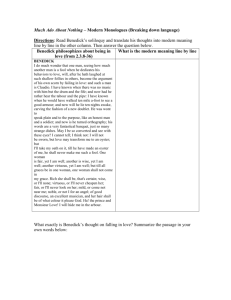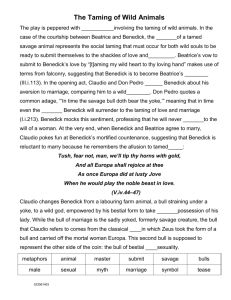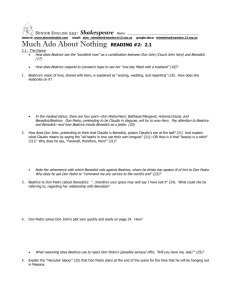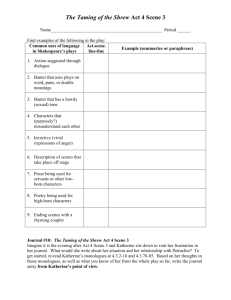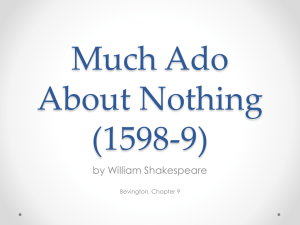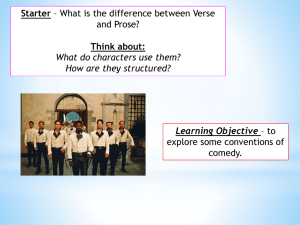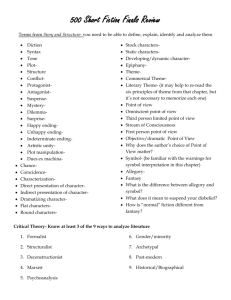Ilyssa Silfen
advertisement
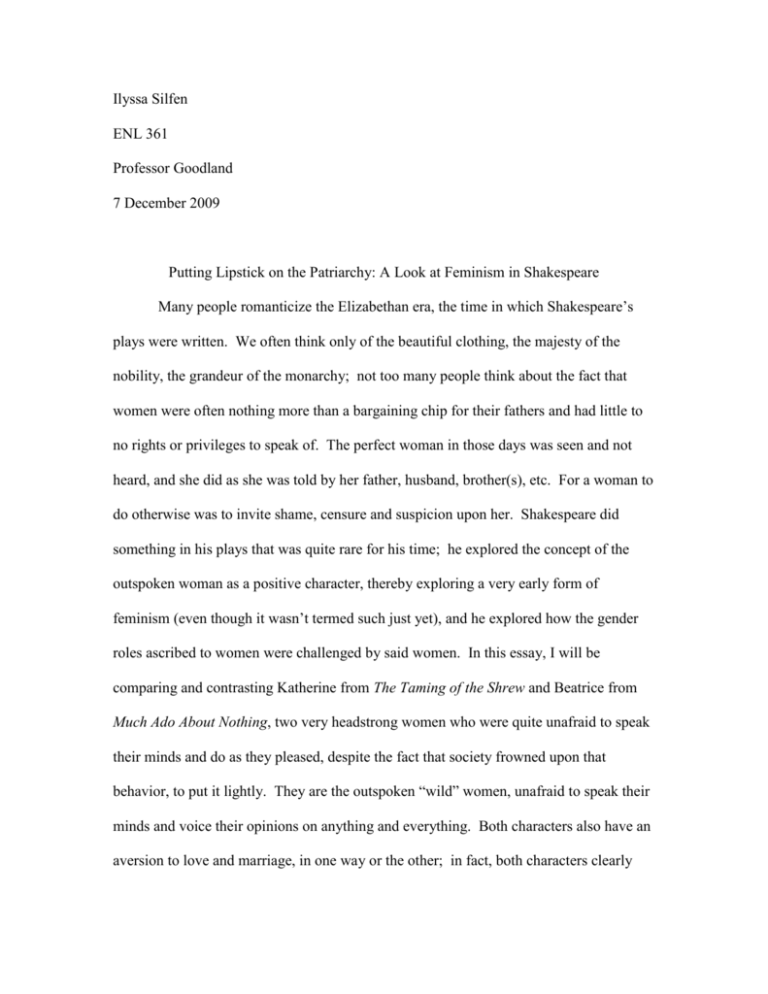
Ilyssa Silfen ENL 361 Professor Goodland 7 December 2009 Putting Lipstick on the Patriarchy: A Look at Feminism in Shakespeare Many people romanticize the Elizabethan era, the time in which Shakespeare’s plays were written. We often think only of the beautiful clothing, the majesty of the nobility, the grandeur of the monarchy; not too many people think about the fact that women were often nothing more than a bargaining chip for their fathers and had little to no rights or privileges to speak of. The perfect woman in those days was seen and not heard, and she did as she was told by her father, husband, brother(s), etc. For a woman to do otherwise was to invite shame, censure and suspicion upon her. Shakespeare did something in his plays that was quite rare for his time; he explored the concept of the outspoken woman as a positive character, thereby exploring a very early form of feminism (even though it wasn’t termed such just yet), and he explored how the gender roles ascribed to women were challenged by said women. In this essay, I will be comparing and contrasting Katherine from The Taming of the Shrew and Beatrice from Much Ado About Nothing, two very headstrong women who were quite unafraid to speak their minds and do as they pleased, despite the fact that society frowned upon that behavior, to put it lightly. They are the outspoken “wild” women, unafraid to speak their minds and voice their opinions on anything and everything. Both characters also have an aversion to love and marriage, in one way or the other; in fact, both characters clearly Silfen 2 state at some point in their respective plays that they will never get married. The central issue that is explored in both plays is that of the gender roles that were ascribed to and practically forced on women in Elizabethan society; each of the two plays acts as a social commentary on these roles through the actions of both Beatrice and Katherine. They are both chastised in some manner for their frank speech and untraditional views on love and marriage, and I believe that this is quite important, along with everything else, in showing to us how central of an issue gender roles for women truly is in both plays. Although Beatrice has quite a bit more leeway with her behavior than Katherine does, we can still see through the comments directed towards them by the men and by some of the other women in their respective plays what was expected of both Beatrice and Katherine in terms of behavior, actions and speech. At the beginning of each of the two plays, Beatrice and Katherine openly display their great displeasure at the thought of getting married. Katherine is a bit more enthusiastic, as it were, in her delivery of her thoughts than Beatrice is, and Beatrice uses more sarcasm and humor than Katherine does, but the basic gist of their statements is the same; they do not want to get married, and they will not get married! Obviously, this open displeasure is met with a great deal of opposition from the men in the play; in Act 1, scene 1 of The Taming of the Shrew, it is revealed that Baptista, Katherine’s father, will not allow his younger, more desirable and more marriageable daughter Bianca (probably because she is so meek and eager to be led) to marry until Katherine has been married off and essentially taken off of his hands. Hortensio remarks that she will never find a husband unless she cools her temper. Upon this statement, Katherine proclaims: I’faith, sir, you shall never need to fear. Silfen 3 Iwis it is not halfway to her heart. But if it were, doubt not her care should be To comb your noddle with a three-legged stool And paint your face and use you like a fool. (1.1.62-66) In other words, Katherine is saying that Hortensio needs not worry about her finding a mate; she does not plan to find a man and marry him anyway, and if she were to decide to marry, and in this case she uses Hortensio as an example, her only care in the marriage would be to beat him over the head (N65) with a stool and then scratch his face until it bled (N66). When you look at this violent imagery in the context of holy matrimony, it becomes quite clear that she has no interest in finding a husband; in fact, you could interpret the images that Katherine conjures up as Katherine fighting the idea of marriage quite literally tooth and nail. Even though Beatrice, on the other hand, is a bit more logical and calm in her rejection of marriage, there are indeed some similarities in their circumstances. When Beatrice speaks frankly of her views on marriage with Leonato and his brother, they both state that she will never find a husband if she continues to speak in such an unladylike manner, once again displaying the lovely notion that having and voicing an opinion makes you undesirable as a woman. At this, Beatrice states: Too curst is more than curst. I shall lessen God’s sending that way, for it is said “God sends a curst cow short horns,” but to a cow too curst, he sends none. (2.1.21-24) As we are shown in these lines, Beatrice is preventing God from sending her a husband, as she does not wish to marry, by being so open with her thoughts and her opinions; in Silfen 4 other words, she embraces her shrewd tongue, as one might call it, because it is preventing her from getting a husband. Later on in the scene, when Leonato expresses his wish that Beatrice find a husband at some point in the future, she replies: Not till God make men of some other metal than earth. Would it not grieve a woman to be overmastered with a piece of valiant dust? To make an account of her life to a clod of wayward marl? No, uncle, I’ll none. (2.1.59-63) Beatrice, in this statement, alludes to the creation of Adam when she states that a woman would not want to be ruled over by what amounts to a glorified speck of dust, nor would she want to give her life over to a piece of marl, which is defined by Webster’s Encyclopedic Unabridged Dictionary of the English Language as “a friable earthy deposit consisting of clay and calcium carbonate, used esp. as a fertilizer of soils deficient in lime (“Marl1”).” If you think about it in that context, you can’t help but agree with her; who in their right mind would let their lives be run by a piece of dirt? In her mind, until she can find a man who has been made of something other than dust (which, if you’re going to follow the Bible, is impossible), marriage just will not be on her list of things to do before she dies. Interestingly enough, marl is also defined as a nautical term, meaning “to wind (a rope) with marline, every turn being secured by a hitch (“Marl2”). Knowing Shakespeare and his history of cunning word choice, he chose to use this word for its double meaning on purpose; obviously he meant to showcase Beatrice’s witty and intelligent argument in rejecting the notion of marriage (the allusion to the Biblical story of the creation of Adam), but perhaps he also meant to showcase her other feelings Silfen 5 towards marriage; perhaps she attributes a feeling of entrapment and a feeling of being “tied down” towards the whole institution. Another aspect of Katherine and Beatrice’s personalities is revealed in their reactions towards finding out that they are the objects of another’s affections. When Petruchio comes calling for Katherine’s hand in marriage, she puts up one hell of a fight; she’s going to keep her independence, no matter what it takes. This is quite evident in the phrases she uses to rebut Petruchio’s advances; when he tells her that she is like a wasp because she is too angry (2.1.222), she replies, “If I be waspish, best beware my sting (2.1.223).” When Kate strikes him after his lewd remark about tongues in tails (2.1.231) and Petruchio threatens to strike her back if she hits him again, she replies without missing a beat: So may you lose your arms. If you strike me, you are no gentleman, And if no gentleman, why then no arms. (2.1.235-237) Katherine not only puts up a fight against her aggressor (as she sees him), she takes particular pride in her ability to stand up for herself, as well as in the “shrewish” behavior that she exhibits. When Petruchio chastises her for being too much like the wasp, she readily identifies with the creature and tells him to watch out for her sting; when Petruchio threatens to strike her after she hits him, she tells him in no uncertain terms that he will lose his arms if he is to do so, and that he is no gentleman if he would be willing to hit a woman. There is a double meaning in the last two lines, of course; when she says “If you strike me, you are no gentleman, / And if no gentleman, why then no arms (2.1.236-237),” she means both that if he is ungentlemanly enough to hit her, then he will Silfen 6 lose his arms, but also that if he is no gentleman, then he has no coat of arms, which is the official mark of the gentleman (N237). This certainly does not sound like a woman who is eager to be wooed. Of course, Katherine isn’t given a choice in the matter, and Petruchio does the Elizabethan equivalent of cracking her over the head with a club and dragging her off to his cave. Beatrice, on the other hand, is a bit more open to the idea of being the object of affection; as a matter of fact, she utterly refutes her earlier behavior and promises to requite Benedick’s love. When Beatrice overhears a staged conversation between Hero and Ursula in which they speak about Benedick’s passionate and allconsuming love for her, she reacts by renouncing her bold behavior and replacing it with love for Benedick: Stand I condemned for pride and scorn so much? Contempt, farewell, and maiden pride, adieu! No glory lives behind the back of such. And Benedick, love on; I will requite thee, Taming my wild heart to thy loving hand. (3.2.114-118) Rather than defending her original thoughts and feelings towards love and marriage, as well as her general behavior, she instead renounces her pride, her contempt and her scorn, and replaces it with a deep affection for Benedick. For whatever reason, she doesn’t defend herself as vehemently as Katherine; in fact, she states quite obviously that nothing good can be in store for contemptuous and proud maidens (N116). Perhaps the fact that she and Benedick had a history together is what has made her change her mind so drastically, and perhaps their separation made her bitter for a time, but no matter the cause, her demeanor changes immediately upon learning of Benedick’s unquenchable Silfen 7 love for her. And then, in yet another twist, in the ending scene, when they are in public with one another, she denies that she loves him at all! When Benedick asks her if she loves him, she states, “Why no, no more than reason (5.4;77).” When Benedick asks her again if she loves him, she replies, “No, truly, but in friendly recompense (5.4.87).” Finally, when the love letters they have each written for one another are revealed to each other and Benedick asks for her hand, she replies in her usual witty manner: I would not deny you, but by this good day, I yield upon great persuasion, and partly to save your life, for I was told you were in a consumption. (5.4.99-101) Why is it that Beatrice admits so readily to loving Benedick while in private, but denies it so heartily, and then acquiesces so begrudgingly, when in public? Once again, the answer may be her earlier heartbreak at the severance of her first relationship with Benedick; she may have been afraid to openly express love for him because she was afraid that their affair would fall apart a second time, and she would have to deal with the humiliation and the grief all over again. When it becomes clear that he means to stay, the walls come tumbling down, but not so much that she loses her personality entirely to his charms. Another thing that is quite different in this situation is that Beatrice is given the choice to be with Benedick, rather than being handed off by her uncle and forced into a marriage that she wants no part of. As I have already explored in this essay, we can see that there is a glaring difference in the options that Katherine and Beatrice are given in their respective situations. Katherine is given no choice whatsoever when it comes to marrying Petruchio; her father is more than happy to have her taken off his hands, and Petruchio is Silfen 8 more than happy to lie to her father in order to have her hand in marriage, and then abuse her once they’ve said “I do” (and even before!) in order to “tame” her. Beatrice, on the other hand, is given a lot more choice in the matter. Her uncles do wish for her to be married, and while it is true that they openly express the desire that she does so, the difference here is that they do not force her to marry anyone; they simply express the hope that she does so in the near future. One could argue that Hero and Ursula force her into a relationship with Benedick through their trickery, but I don’t believe that this is so. She always had the choice to say no, especially when she found out that the entire thing was a ruse; however, she accepts Benedick’s affections and agrees to be his wife. Do I feel that the outcomes of both plays would have been different if the tables were turned? Absolutely! If Katherine had been given the choice, I don’t think she would have ever married; I think that she would have been a happy bachelor, as it were, until the end of her days, and I don’t think she could have led a happier life than that. If Beatrice had had her right to choose stripped from her, I think that the outcome for her in the play would have been less satisfying and more horrifying; her outcome would have been more like Katherine’s, trapped in an abusive marriage and feigning love and adoration for her abuser just to stay alive. Silfen 9 Works Cited Mowat, Barbara A. and Paul Werstine. Notes, Much Ado About Nothing. Edited by Barbara A. Mowat and Paul Werstine, New York: Simon & Schuster, 2009. Mowat, Barbara A. and Paul Werstine. Notes. The Taming of the Shrew. Edited by Barbara A. Mowat and Paul Werstine. New York. Simon & Schuster, 2009. Shakespeare, William. Much Ado About Nothing. Edited by Barbara A. Mowat and Paul Werstine. New York: Simon & Schuster, 2009. Shakespeare, William. The Taming of the Shrew. Edited by Barbara A. Mowat and Paul Werstine. New York: Simon & Schuster, 2009. “Marl1.” Webster’s Encyclopedic Unabridged Dictionary of the English Language. New York: Portland House, 1997. 878. “Marl2.” Webster’s Encyclopedic Unabridged Dictionary of the English Language. New York: Portland House, 1997. 878.

